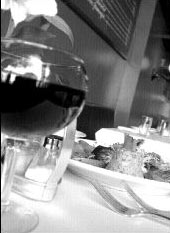ESSENTIAL BAKING CO. 1604 N. 34th, 545-8431 ALBERTSON’S MERCER ISLAND 2755 77th S., 232-0244
LEAH’S BAKERY 2114 N.E. 65th, 985-4627
SWEET LORRAINE’S 3055 21st W., 301-9100
As anyone with an occasional craving for pastrami can tell you, Seattle is not particularly Jewish. But deli is only a tiny part of edible traditions. A plenitude of breads and pastries is available for those who want to explore beyond the World of Deli.
We know that food is more than simply sustenance—special foods can symbolize entire cultures, giving us history along with calories. This year, add a little meaning to your harvest with a celebration of Jewish cuisine.
This year, the Jewish New Year fell on Sept. 6. Yom Kippur (the Day of Atonement) follows on the 15th, and Sukkot, the harvest festival to end all harvest festivals, is celebrated on the 21st.
Rosh Hashanah, literally the “head of the year,” is a time filled with sweetness. Challah, the shiny braid of bread eaten with every Saturday Sabbath meal, appears only during this week as a shiny spiral symbolizing the year’s cycle. Sultanas or raisins are added to ensure sweetness, for both bread and future events. (Unfortunately, “this week” was last week; better luck next year.)
Leah’s Bakery supplies challah of every kind—white, wheat, plain, raisin, and fruit—ranging from a single roll (55 cents) to a 1-and-a-half-pound loaf ($5.95). Each is softly solid and slightly sweet. Essential Baking’s offering is sweeter, with a denser crust, and organic, if not kosher.
A third option in town is brand-spanking-new: Sweet Lorriane’s has been selling lovely challah at farmer’s markets around town and opened a retail location just last week. Available in plain, poppyseed, and sesame (all $5), theirs is the best of the bunch, with just the right balance of pillowy, melt-in-your-mouth richness and wholesome chew. (But pre-order by Wednesday!)
Challah goes well with everything, but for best results, try it with a gravy-laden dinner of brisket, potatoes, glazed carrots, and, of course, some nice chopped liver. After the heavy dinner, combine a stroll with an important tradition for the holiday: Head toward the nearest flowing body of water and meditate or pray; this is known as taslich, and the water symbolically washes away the sins of the last year. Give special thanks to the fish in your chosen body of water; they are believed to be immune to the evil eye and offer you and yours some of their protection.
YOM KIPPUR IS A DAY dedicated to fasting, atonement, and apology. The last meal before the fast—dinner the night before—is often soup. From a practical point of view, the extra fluid staves off dehydration during the fast. But a good bowl of soup is inherently a bowl of forgiveness, a bowl of apology, a bowl of soothing comfort. No matter what your heritage, your family has its own version of chicken noodle, be it Campbell’s or be it scratch. Call your parents and get that recipe; maybe even a good story about the origins. Brew up a batch, load up the Tupperware, and deliver some to that friend you haven’t seen for months, that teacher you argued with at the last parent conference, those neighbors you called the cops on when the party went too long. Apologize. Offer your soup. Hug, or at least laugh together. Sleep well, and feel grateful for the special holiday that brought about the healing.
Lastly, Sukkot. Strict tradition involves building a three-sided outdoor shelter known as a sukkah, symbolizing the temporary desert shelters the Jews built in the wilderness. A covered deck is a nice alternative—really, anything that gets your family eating the harvest celebration meal outdoors. Whether sukkah or deck, decorate it with all the harvest-themed items you can find. Gourds and pumpkins are appropriate, even more so when tossed around by a giggling crowd.
Like turkey at Thanksgiving, kugel is inescapable. Kugel is just a pudding; it always has noodles or taters, but everything else is up to the cook. In fact, asking “what is kugel” is a bit like asking “what are mashed potatoes”? Kugel simply is. Zen Judaism.
Kugels can be savory or sweet; dense, crunchy, or airy; a side dish, a dessert, or a breakfast; based on either noodles or potatoes. Albertson’s imports fine kugel from Brooklyn; the peppery potato souffl頨$4.99) is a wonderful companion for rich meats. Leah’s fine spinach version ($5.50 small, $9.75 large) goes well with any chicken dish: Fat wads of spinach cozy up to onion and thin, crispy noodles for remarkably homemade-esque results. The sweet noodle is good but heavy. Broad egg noodles form a crispy top and dense custardy bottom that simply reeks of cinnamon—pop one of these in the oven for the best-smelling house on the block. Try making one at home; there’s no easier dish to make than kugel.
With every holiday meal, add at least one fruit. Rosh Hashanah traditionally ends with slices of apple dipped in honey. Quinces drizzled with cinnamon syrup are served to break Yom Kippur’s fast. As a messy treat, share a pomegranate with your kids at any of the meals; supposedly, there is one seed for every good deed we do throughout each year.
Perhaps one of those deeds should be “didn’t stain Mom’s tablecloth with pomegranate juice.” Perhaps your first deed will be introducing a whole new set of family traditions, or bringing a honey cake to your office. It’ll be worthwhile. And tasty. Shanah Tovah!
Check out Mamma Lightner’s apricot-nut kugel recipe.








